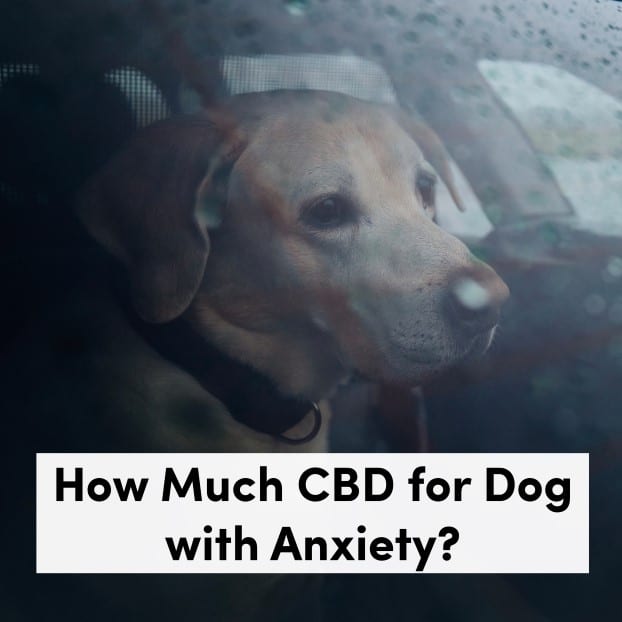How Much CBD for Dog with Anxiety? – Things You Need to Know

Posted on May 22nd, 2021
Dogs, like humans, can suffer from anxiety. It can affect all breeds. What makes it worse for dogs is that they can’t just tell you about their anxiety. You need to be aware of its symptoms in order to recognize it and seek possible treatments. It is important to mention here that all dogs, just like humans, suffer from some degree of anxiety from time to time. However, there are times when a dog can develop extreme levels of anxiety which, if not treated, might become a disorder and can lead to various issues.
What Causes a Dog Anxiety?
Dogs can become anxious for a number of reasons. This section will cover some of the major reasons already identified by experts in the field:
Experiences in early life: The early life experiences have a huge impact on dogs becoming vulnerable to anxiety disorder.
Fear: Various types of stimuli and new environments can lead to anxiety in dogs. When they hear loud noises or come in contact with strange animals or strange people, it can make them anxious. In many cases, their reaction is brief, but it can hurt them more in the long run.
Separation: Experts estimate that around 14% of dogs suffer from separation anxiety. It affects them as they are unable to feel normal when they are separated from their family members or are left alone. They typically resort to certain undesirable behavior such as:
- Defecating or urinating inside the house
- Barking
- Destruction of furniture and furnishings inside the house, etc.
Aging: As the dogs get older, they might become anxious. It might be because of cognitive dysfunction syndrome. Dogs suffering from CDS have declining perception, learning, memory, and awareness. It causes confusion and leads to anxiety.
Effects of Dog Anxiety
As discussed in the above paragraphs, dogs can’t really tell you that they are anxious, but it will show in their behavior. Keep a lookout for symptoms such as:
- Excessive barking.
- Depression.
- Destructive behavior.
- Restlessness.
- Repetitive behaviors.
- Pacing.
- Panting.
- Drooling.
- Defecating or urinating in the house.
- Aggravation, among others.
Sometimes, these behaviors occur due to occasional events. However, f these become recurrent and lead to more serious issues, you can certainly tell that you are dog is suffering from an anxiety disorder. If you don’t treat this disorder in time, it might lead to dangerous behavior. In time, the dog might become much more aggressive and might harm other humans or animals.
One of the most common symptoms associated with separation anxiety for dogs is urinating and defecating in the house. Dogs suffering from separation anxiety also typically display destructive behavior around their entry and exit points from the house itself. They might try to break out of windows, dog crates, or even doors resulting in injuries.
Do All Dogs Get Anxious?
Anxiety can affect all breeds of dogs. However, it is very much likely to affect senior dogs.
Conventional Treatments for Dog Anxiety
If you already identified that your dog is suffering from anxiety, you should first talk to your veterinarian. They can help you figure out the type of anxiety affecting your dog as well as what possibly caused it. They will also help you rule out any medical conditions that might be at the root of the anxiety symptoms. As far as the conventional treatments for dog anxiety, veterinarians typically recommend preventive strategies, medications, and training, among other things.
In most cases, training is recommended by veterinarians to calm down your dog. The thinking behind the training is to change the response of the dog when faced with a particular stimulus responsible for their anxiety. When trained successfully, the aggressive or anxious behavior of your dog that comes out as a response would now be a more amicable or desirable behavior. Desensitization is another technique recommended by veterinarians for treating anxiety in dogs. It typically involves repeated exposure of the dog to the source of their anxiety. Exposing them repeatedly to the source of anxiety in small doses while encouraging a positive response might ultimately change it from then on.
If the veterinarian determines that a dog is suffering from a serious anxiety disorder, they are likely to recommend certain medications. Typically, antidepressants and SSRIs are what they prescribe to dogs dealing with anxiety. Likewise, to help calm down a dog after exposure to certain events such as fireworks, some of these medications might be their recommendation
If the anxiety in the senior dog is due to cognitive dysfunction syndrome, the veterinarian might recommend a different medication. Some natural therapies are also able to help dogs deal better with anxiety.
What is CBD?
CBD or cannabidiol is a chemical compound derived from industrial hemp. It is also present in marijuana, but marijuana also contains much THC, which has psychoactive properties. CBD does not have any psychoactive properties. In fact, it can help in diluting the psychoactive effects of THC. There are many CBD products available in the market today for dogs as well as humans. These products have less than 0.3% concentration of THC, which is the federal limit for legal CBD.
Effects of CBD
Here is a list of some of the better-known potential benefits or effects of CBD:
Pain Management – One of the most well-known, potentially therapeutic effects of CBD is pain management. In fact, this compound was used to treat pain for thousands of years in different forms. It works by activating the Endocannabinoid system, which regulates a variety of bodily functions, including pain perception. CBD is similar to endocannabinoids produced by the body that binds to receptors in the Endocannabinoid System. In this manner, it helps provide relief from chronic pain.
Relief from Anxiety and Depression – There are a lot of medications out there for treating anxiety and depression. Many of those medications not only fail to treat the root cause but also have several horrible side effects. On the other hand, CBD use seems to be able to relieve symptoms of anxiety and depression, according to much anecdotal evidence from users.
Acne Reduction – CBD also seems to be effective at reducing acne as it has anti-inflammatory properties, which means it can reduce sebum production.
Anxiety in Dogs – Many people find CBD to be highly effective at providing relief from anxiety to their dogs. Many dog owners found CBD to be effective for treating anxiety in dogs. However, how much CBD for dog with anxiety is enough for it to be effective. Too low or too high an amount can cause additional problems.
How Does CBD Works for Dogs?
Similar to the Endocannabinoid system in humans, dogs also have an Endocannabinoid system. The system consists of Endocannabinoid receptors, Endocannabinoids, and enzymes.
The endocannabinoid system, or ECS for short, is responsible for regulating various biological and physiological functions in the body. Endocannabinoids are in constant production by your and your dog’s bodies. If something in the body goes out of balance, the system helps in bringing the body back into balance via endocannabinoids.
CBD is a type of plant-derived cannabinoid that is similar in shape and action to the natural cannabinoids in a dog’s body. Due to this, it is able to interact with ECS, which means it can help in regulating certain bodily functions in dogs. The CBD molecules bond with the ECS receptors in the Endocannabinoid system to trigger certain actions. The result they yield ends up providing relief from pain, anxiety, and various other conditions.
How Much CBD For Dog with Anxiety Is Enough?
Most people who are aware of the medicinal benefits of CBD usually lean positively towards trying CBD for dogs. But just how much CBD for dog with anxiety is not the same as CBD dosage for humans. This is why you need to be careful and make appropriate measurements before giving CBD to your dog.
How Much CBD for Dog with Anxiety Disorder?
The right dosage of CBD relies on their weight as well as age. In general, it is best to give 1 mg to 5 mg for every 10 pounds of weight. Experts recommend starting at the low-end and gradually increasing the dosage each week. You will need to experiment with the dosage in order to find that sweet spot that works perfectly for your dog.
You should choose CBD dosages based on the weight of your dog. Always start at the lower end. You do not need to worry too much as it does not have any toxic effects. You should know that CBD kicks in around 30 minutes which means the effect isn’t instant, and you will need to plan the dosage.
Can I Tell How Much CBD for Dog with Anxiety Is Good Based on Any Signs?
As far as the dosage of CBD for dogs with anxiety concerns, you can’t really determine the dosage based on any visible signs. First and foremost, it is best to confirm with a veterinarian that your dog is indeed suffering from anxiety. Once confirmed that your dog needs relief from anxiety, you should consider buying a high-quality CBD product. Make sure it does not contain any THC as it can be dangerous for dogs.
Just how much CBD for dog with anxiety oscillates in the range of 1 to 5 mg per 10 pounds of body weight for dogs. Though, the dosage is also somewhat dependent on their breed. If there is any doubt, do not shy away from asking an animal expert who has experience in using CBD to help dogs deal with anxiety.
Also, if you are looking for high-quality CBD for your dog, Tanasi.com has a selected variety of only the best CBD products available in the market today.




